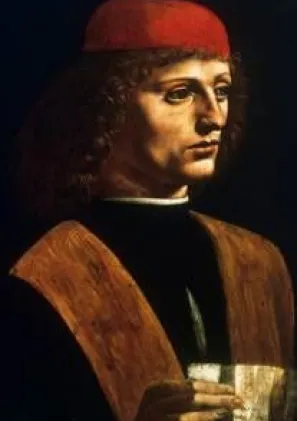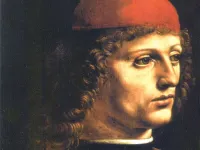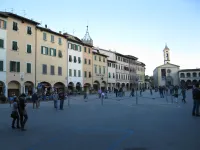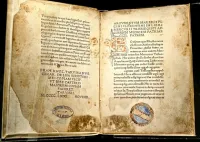Biography
1433 - 1499
"Books that distribute things... with as daring a freedom as we use in dreams, put us on our feet again."
- Father Marsilio Ficino
Marsilio Ficino probably never left the territory of Florence, yet he still managed to bring vital change to European society. A true Renaissance man, he was a scholar, doctor, musician, astrologer, linguist, priest, and one of the most influential philosophers of the early Renaissance. Founder and head of the Plato Academy of Florence, his translations and commentaries on the writings of Plato and other Classic Greek authors marked the beginning of the Florentine Platonist Renaissance. His complete translation of Plato’s dialogues, published in 1484, was the earliest complete translation of Plato into a western tongue, and was used for centuries. His commentary of Plato’s Symposium (“De amore’) is said to be the source of the term ‘Platonic love;’ indeed Ficino wrote of his platonic love for his “unique friend” Giovanni Cavalcanti in a series of ardent love letters. Though he led a life of chastity since becoming a priest in 1473, his letters indicate his erotic impulses were directed exclusively towards men. His main original work, Theologia Platonica de immortalitate animae (The Platonic Theology or The Immortality of Souls), stressed the compatibility of philosophy and religion by proving the immortality of the soul. Truly ahead of his time, it was not until 1513 that the Roman Catholic Church itself declared the natural immortality of the soul as dogma - 14 years after Ficino‘s death. Desiring a union of philosophy and religion, Ficino explained that ancient philosophy was all part of the process of divine revelation, the revealing of God through man. His influence cannot be overestimated - by disassociating antiquity from paganism he aligned Christianity with an appreciation of classic culture, paving the way for the flowering of the Renaissance. He died in 1499 at the age of 65
1433 - 1499
"Books that distribute things... with as daring a freedom as we use in dreams, put us on our feet again."
- Father Marsilio Ficino
Marsilio Ficino probably never left the territory of Florence, yet he still managed to bring vital change to European society. A true Renaissance man, he was a scholar, doctor, musician, astrologer, linguist, priest, and one of the most influential philosophers of the early Renaissance. Founder and head of the Plato Academy of Florence, his translations and commentaries on the writings of Plato and other Classic Greek authors marked the beginning of the Florentine Platonist Renaissance. His complete translation of Plato’s dialogues, published in 1484, was the earliest complete translation of Plato into a western tongue, and was used for centuries. His commentary of Plato’s Symposium (“De amore’) is said to be the source of the term ‘Platonic love;’ indeed Ficino wrote of his platonic love for his “unique friend” Giovanni Cavalcanti in a series of ardent love letters. Though he led a life of chastity since becoming a priest in 1473, his letters indicate his erotic impulses were directed exclusively towards men. His main original work, Theologia Platonica de immortalitate animae (The Platonic Theology or The Immortality of Souls), stressed the compatibility of philosophy and religion by proving the immortality of the soul. Truly ahead of his time, it was not until 1513 that the Roman Catholic Church itself declared the natural immortality of the soul as dogma - 14 years after Ficino‘s death. Desiring a union of philosophy and religion, Ficino explained that ancient philosophy was all part of the process of divine revelation, the revealing of God through man. His influence cannot be overestimated - by disassociating antiquity from paganism he aligned Christianity with an appreciation of classic culture, paving the way for the flowering of the Renaissance. He died in 1499 at the age of 65
Demography
Demography
Gender Male
Sexual Orientation Gay
Gender Identity Cisgender
Ethnicity Caucasian/White
Faith Construct Catholic
Nations Affiliated Italy
Era/Epoch Renaissance/Reformation (1300-1700)
Field(s) of Contribution
Academics
Humanities
Music
Philosophy
Religion
Science
Commemorations & Honors
Piazza Marsilio Ficino in Figline Valdarno Tuscany Named After Him
Demography
Gender Male
Sexual Orientation Gay
Gender Identity Cisgender
Ethnicity Caucasian/White
Faith Construct Catholic
Nations Affiliated Italy
Era/Epoch Renaissance/Reformation (1300-1700)
Field(s) of Contribution
Academics
Humanities
Music
Philosophy
Religion
Science
Commemorations & Honors
Piazza Marsilio Ficino in Figline Valdarno Tuscany Named After Him
Resources
Resources
Boyle, Marjorie O'Rourke. "Gracious Laughter: Marsilio Ficino's Anthropology." Renaissance Quarterly 52 (Autumn 1999): 712-41.
Dall'Orto, Giovanni. "Ficino, Marsilio." Who's Who in Gay & Lesbian History from Antiquity to World War I. Robert Aldrich and Garry Wotherspoon, eds. London: Routledge, 2001. 159-61.
Maggi, Armando. "Renaissance Neoplatonism." Gay Histories and Cultures. George E. Haggerty, ed. New York: Garland, 2000. 741-42.
Norton, Rictor, ed. "Platonic Love." My Dear Boy: Gay Love Letters through the Centuries. San Francisco: Leyland Publications, 1998. 46-48.
Rees, Valery. "Marsilio Ficino, Renaissance Man." History Today 49 (July 1999): 45-52.
http://en.wikipedia.org/wiki/Marsilio_Ficino
http://rictornorton.co.uk/ficino.htm
https://www.advocate.com/arts-entertainment/2016/10/21/15-gay-romances-renaissance-era?pg=1
https://retrospectjournal.com/2019/11/10/homosexuality-in-renaissance-f…
Resources
Boyle, Marjorie O'Rourke. "Gracious Laughter: Marsilio Ficino's Anthropology." Renaissance Quarterly 52 (Autumn 1999): 712-41.
Dall'Orto, Giovanni. "Ficino, Marsilio." Who's Who in Gay & Lesbian History from Antiquity to World War I. Robert Aldrich and Garry Wotherspoon, eds. London: Routledge, 2001. 159-61.
Maggi, Armando. "Renaissance Neoplatonism." Gay Histories and Cultures. George E. Haggerty, ed. New York: Garland, 2000. 741-42.
Norton, Rictor, ed. "Platonic Love." My Dear Boy: Gay Love Letters through the Centuries. San Francisco: Leyland Publications, 1998. 46-48.
Rees, Valery. "Marsilio Ficino, Renaissance Man." History Today 49 (July 1999): 45-52.
http://en.wikipedia.org/wiki/Marsilio_Ficino
http://rictornorton.co.uk/ficino.htm
https://www.advocate.com/arts-entertainment/2016/10/21/15-gay-romances-renaissance-era?pg=1
https://retrospectjournal.com/2019/11/10/homosexuality-in-renaissance-f…



